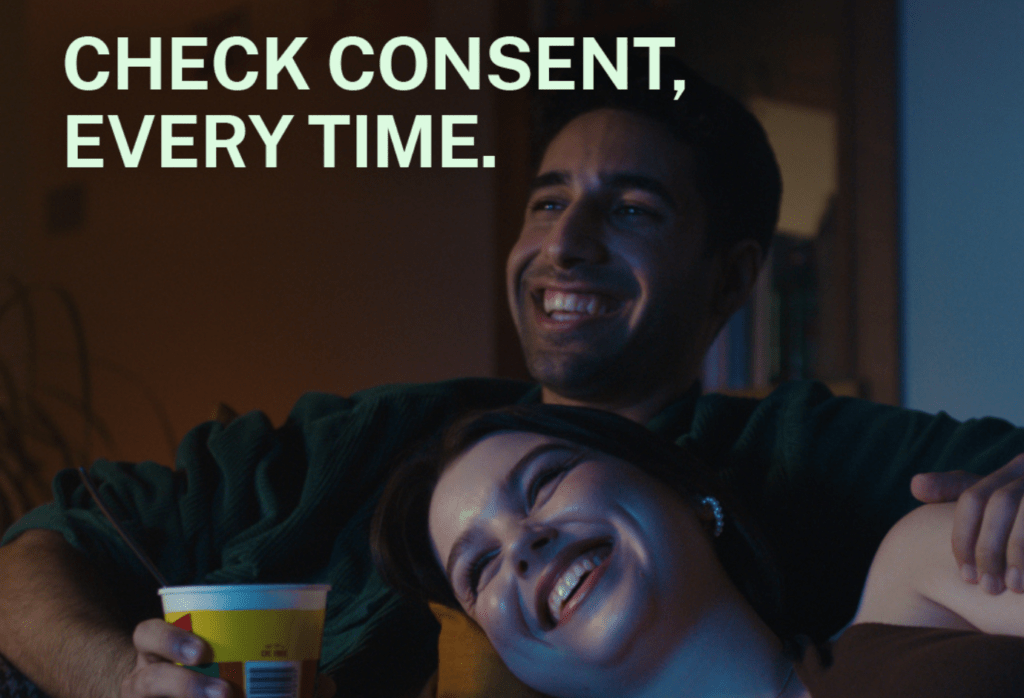Today, new affirmative consent laws come into effect in New South Wales. Passed in November last year, the laws aim to strengthen and modernise the previous legislation around sexual consent, and come a week after the state government launched its “Make No Doubt” campaign.
“These laws set clearer boundaries for consensual sex, reinforce the basic principle of common decency that consent is a free choice involving mutual and ongoing communication, and reinforce that consent should not be presumed,” NSW AG, Mark Speakman said in a statement.
“The consent reforms are not just about holding perpetrators to account, but changing social behaviour with clearer rules of engagement to drive down the rate of sexual assaults.”
“The NSW Government is committed not just to ensuring our laws are fit for purpose, but also to ensuring all members of community have the knowledge, understanding and skills they need to develop and maintain respectful relationships.”
Under the new laws, persons engaging in sexual activity cannot assume someone is consenting because they don’t say no, or are forced or coerced into saying yes.
Consent can only be given freely and voluntarily, and must be present for every sexual act. If someone consents to one sexual act, it doesn’t mean they’ve consented to others.
Over the past six months, NSW Government have worked with agencies to ensure judicial officers, prosecutors, defence lawyers and police are well-advised about the new laws. Education programs and resources for judges, lawyers and police will be created, as well as an update on the NSW Judicial Commission’s Criminal Trial Courts Bench Book to include the reforms.
“The NSW Government will take an active and engaged approach to implementation and monitoring of the reforms,” Speakman said.
“The Act includes specific provisions requiring a statutory review to be conducted three years after the commencement of the reforms.”
“The three-year review will be supported by a Bureau of Crime Statistics and Research analysis of key criminal justice markers, which may include policing outcomes, court outcomes, appeals, sentences, time to justice, and the characteristics of victims and defendants.”
Saxon Mullins, Director at Rape and Sexual Assault Research and Advocacy, and a leading figure behind the establishment of the laws, told reporters last week that she hopes the new affirmative model can change society’s understanding of consent
“It’s removing that ambiguity, it’s removing that assumption of consent unless otherwise advised,” she said. “This shows we are moving towards a world where we are ending sexual violence.”
“This is real world stuff, I think that showing those real scenarios will make a big impact,” she added, referring to the “Make No Doubt” campaign ads.
While the new legislation is welcome news for many sexual assault advocacy groups, some in the legal profession are wary that the new laws could trigger a surge of sexual assault cases brought before the courts.
Margaret Cunneen SC, told the Daily Telegraph “There are so many sex cases in the system now it is just ridiculous and no doubt there will be more because of this.”
“(It will) hold up the real cases with merit and be very unfair on genuine victims and anyone wrongly accused has to wait longer to have his or her name to be cleared.”
Jayne Doherty, NSW Child Abuse and Sex Crimes Squad Commander Detective Superintendent, told ABC that police are backing the changes.
“The NSW Police Force is supportive of moves to simplify and strengthen consent laws in NSW and a legislative model for affirmative consent,” she said.
“The new laws include scope for an evaluation of the legislation by police on investigations, prosecutions, and complainants’ experience with the criminal justice system at a later date.”
Executive Director at Rape and Sexual Assault Research and Advocacy, Dr Rachael Burgin, believes that despite the law striking a better balance between victim/survivors and the accused, concerns about issues in the justice system remain.
“It’s such a disappointment that we’re tinkering with a system when we need a system overhaul,” Dr Burgin told SBS.
“We’ve stripped survivors of their personhood in such a horrible way, and all of that needs to change. And it will struggle to change in a criminal justice system that is built on patriarchal, white privilege.”
Dr Burgin believes the addition of independent legal representatives for victims, plus specialist courts for sexual assault cases would be better options for survivors re-engaging in traumatic experiences.
“The experiences of victim/survivors tells us their engagement with police is terrible,” she said. “Victim/survivors don’t feel like they were believed or heard, but they also often have to tell their story 17 times to different officers.”
According to Dr Burgin, police should also be proficiently educated and trained to better communicate with victim/survivors during the critical stages of a criminal prosecution of sexual assault.
If you or someone you know is impacted by sexual assault or family and domestic violence, you can call 1800RESPECT on 1800 737 732 or visit 1800RESPECT.org.au.
If you are in immediate danger, call 000.


